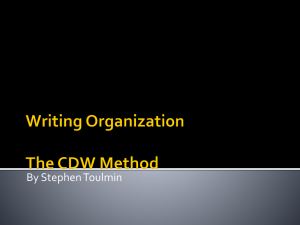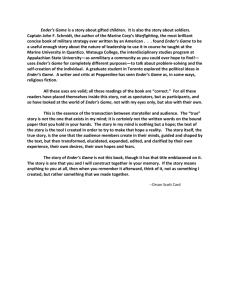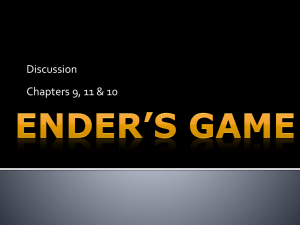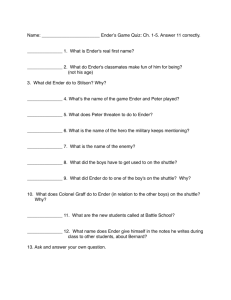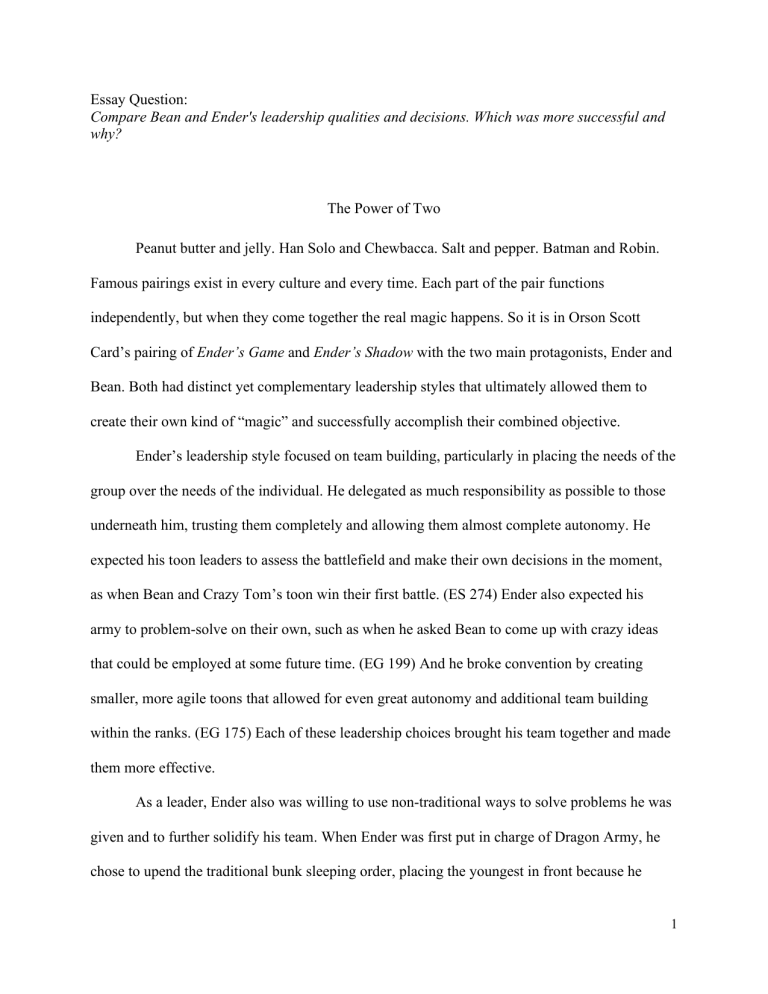
Essay Question: Compare Bean and Ender's leadership qualities and decisions. Which was more successful and why? The Power of Two Peanut butter and jelly. Han Solo and Chewbacca. Salt and pepper. Batman and Robin. Famous pairings exist in every culture and every time. Each part of the pair functions independently, but when they come together the real magic happens. So it is in Orson Scott Card’s pairing of Ender’s Game and Ender’s Shadow with the two main protagonists, Ender and Bean. Both had distinct yet complementary leadership styles that ultimately allowed them to create their own kind of “magic” and successfully accomplish their combined objective. Ender’s leadership style focused on team building, particularly in placing the needs of the group over the needs of the individual. He delegated as much responsibility as possible to those underneath him, trusting them completely and allowing them almost complete autonomy. He expected his toon leaders to assess the battlefield and make their own decisions in the moment, as when Bean and Crazy Tom’s toon win their first battle. (ES 274) Ender also expected his army to problem-solve on their own, such as when he asked Bean to come up with crazy ideas that could be employed at some future time. (EG 199) And he broke convention by creating smaller, more agile toons that allowed for even great autonomy and additional team building within the ranks. (EG 175) Each of these leadership choices brought his team together and made them more effective. As a leader, Ender also was willing to use non-traditional ways to solve problems he was given and to further solidify his team. When Ender was first put in charge of Dragon Army, he chose to upend the traditional bunk sleeping order, placing the youngest in front because he 1 “knew that didn’t intent to be like other commanders.” (EG, 157). Later Bean observed, “Most commanders make sure all good news comes from them. ... Wiggen’s whole technique is building up his toon leaders.” (ES 275) These actions, along with others, created a sense of camaraderie in his army. Ender’s willingness to break the rules was amplified when he felt the rules were unfair. When Dragon army faced overwhelming odds against two armies in what turned out to be its last battle together, Ender broke all the rules and ended the game before the traditional fighting had ended. Bean’s observation summed up Ender’s approach – “they thought they were putting Ender to the ultimate test, making him fight two armies ... [but] he beat them – he sidestepped the test.” (ES, 345) In every situation, Ender lead by finding novel ways to solve each problem given to him while further endearing his followers to him. Ironically, while Ender naturally brought people together with his egalitarian style of leadership, he personally struggled with feeling completely alone. On several occasions, when he was in his most precarious and deadly situations, the adults orchestrating his education ensured that he received no help. First with Stilson on Earth and later with Bonzo at Battle School, Ender faced a mortal enemy, and he did it alone. Both times he succeeded because he was willing, against his better nature, to do whatever it took to make sure he was never threatened again. But the result was that in these moments, Ender falsely learned that he could depend on no one but himself. In this respect, this instinct of not being able to depend on those around him closely resembled Bean’s leadership style. In contrast to Ender, who comfortably lead his group from within, Bean’s leadership style mimicked his loner and rebel personality. Throughout the book, Bean went off on his own to solve problems. In Rotterdam, Bean discovered the truth about Poke’s death because he 2 suspected something and sneaked away from the family at night. When he first arrived at Battle School, Bean crept through the air vents alone to learn about the station. Even when working with his fellow soldiers in a toon, Bean had no trouble taking initiative and moving “without taking orders.” (ES 274) And similar to Ender, Bean was also comfortable breaking the rules – but he chose to break the rules to accomplish his own ends. When he figured out how to login to the computer as a teacher and had access to all the system’s records, his goal was to learn as much as possible about his new location. (ES 184) In each case, Bean worked alone – keeping his thoughts and motives to himself, even when it could have benefited the others. This desire to serve himself carried through into how he approached his leadership role and relationship with Ender. Yes, he wanted to win battles with Dragon Army. But he always approached situations with the inevitable arrogance that came because he was smarter and faster than everyone else – including Ender. “The real test for me will be seeing if I can stand it when Wiggen makes some stupid mistake and I have to sit here as an ordinary soldier and watch him do it.” (ES 280) Later, Bean’s thoughts betrayed his arrogance again – “Have you finally seen and understand who I am? That I’m you, only smarter and less likeable?” (ES 296) And this approach kept him from sharing valuable information when Ender began to confide in him. “Better to keep silence,” he thought to himself as they talked. (ES 298) For most of the book, Bean saw his leadership role as separate and above everyone around him –and one that was selfserving. Although he often worked alone, Bean was able to use his extreme intelligence to benefit others around him when he chose to. But even then, he still did so to also serve himself. His innate ability to size up other people and see how their natural aptitudes would benefit the dynamics of a specific group made him an invisible leader in each group he became involved in. 3 In Rotterdam, Bean sized up Poke and her crew and saw what they needed. And then he was able to use his persuasive skills to convince her to use his plan to capture Achilles and convince him to protect the “family” to everyone’s benefit, including Bean’s. Later, Graff asks him to create a recruit list for Ender’s new army. Bean responded by strategically choosing an ideal, underappreciate group of soldiers for Ender. Ender agreed when he stated “It was no accident that I got the soldiers I got. The launchies, the rejects from other armies, but put them together and my worst soldier could be a toon leader in another army.” (ES 297) Again, while Dragon Army was indeed everything Bean thought it would be, it also allowed Bean to become more prominent and further his own agenda. Bean’s instinct to always put his personal agenda ahead of others stemmed from his life experience, which taught him that his survival depended completely on taking care of himself. Like Ender, he also believed that no one would come to his rescue and that he must always look out for himself. His earliest memories were of saving himself, a scenario that played out over and over again from the streets of Rotterdam to his ingenious entrapment of Achilles at Battle School. However, Ender tended to protect himself with brute strength seasoned with the element of surprise, Bean depended on his superior intelligence to out-think and outsmart his opponent. In the end, both Bean and Ender’s leadership styles were influenced by their similar innate desire to survive at all costs. When they approached their final goal, both Ender and Bean had to use their leadership styles, as well as push past their natural instincts to succeed. Ender had to lean on his team, especially as he became more and more exhausted by the end of the mission. He was able to do this because he had delegated most of the individual decisions as he had done in Battle School, and his team was trained to take responsibility and make spur-of-the-moment tactical decisions. 4 They also trusted and loved him because of the relationships he had built with them. But doing so meant he had to trust that they would be there for him – holding him up in a moment of dire consequence. He had to trust that he wouldn’t be alone. Bean’s ability to work both alone and with a team became increasingly important as he took on the responsibility of both managing his squadron and watching Ender’s overall strategy unfold in each battle. Again, Bean’s ability to size up the situation and the individuals in the group became increasingly important as other members of the team began to fail. (ES 439, 442) Acting as unseen backup for Ender and supporting him when he started to fail meant that Bean was unable to perform at his personal best, but he willingly made the sacrifice. Thus, the success of the group required Ender to rely on Bean and the others when he needed help the most and required Bean to fully join the group by placing the groups needs above his own. The goal was the total destruction of the Bugger home world and the salvation of Earth. It could only have been accomplished by two brilliant complementary commanders working together. “Lincoln and Grant,” as Bean said. (ES 266) Thus, by leveraging their strengths and overcoming their weaker instincts, both Ender and Bean made decisions with their unique leadership styles that allowed them to succeed in saving the human race. Alone, neither could have accomplished the goal. But together, using the “magical” power of synergy that happens when two great minds come together, they succeeded. 5
